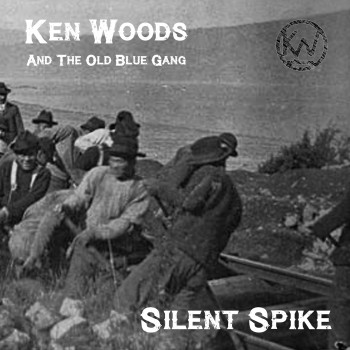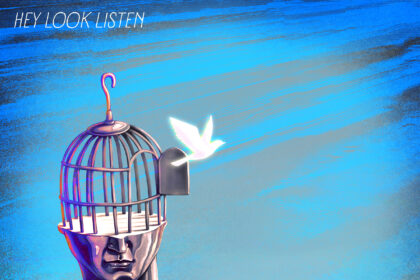Ken Woods and The Old Blue Gang have made a record with ”Silent Spike” and have built a time machine with strings, grit, and conscience. This isn’t background music or passive listening. It’s a heavy, haunting journey through one of the most overlooked chapters of American history: the story of the Chinese railroad workers, the so-called “Silent Spikes,” who laid the steel arteries of the western United States and were then forgotten, erased, or brutalized. Woods doesn’t just pay tribute—he asks hard questions, offers no easy answers, and lets the music carry the weight of ghosts too long ignored.
Opening with ‘The Voyage’, the album sets a tone of quiet dread and trembling beauty. You can hear the ocean in the chords, the lurch of distant lands, the dream and the disorientation of crossing seas toward uncertain labour. There’s a folk-flecked melancholy here that immediately centres the record’s emotional tone—not mournful, exactly, but reverent, like a candlelit vigil in sound. It’s a strong statement of intent from Woods, whose lyrics feel more like poetry than protest slogans. He’s not shouting. He’s remembering, carefully.
Then comes ‘Steel Stretcher’, and suddenly the tempo shifts. Here, the guitars dig in harder, echoing the clang and urgency of rail being driven through rock and wilderness. Woods’s bandmates—Joe Hoskin on bass and Steve Roberts on drums—fall into a raw, propulsive groove, evoking both the labour and the danger of building the railroad. The song pulses with motion, but also with tension—there’s no triumph here, only the sense of cost. The workers’ sweat and broken backs hum just below the surface, unspoken but felt in every note.
‘Dead Line Creek‘ is the record’s crown jewel—a sprawling, 21-minute epic that redefines what “folk rock” can be. Woods describes it as a cowboy homage to Hendrix’s Machine Gun, and that comparison isn’t just hype. The track is a brutal, cinematic retelling of one of the worst anti-Chinese massacres in American history. It’s not just long—it’s alive. The improvisation between the trio doesn’t meander aimlessly; instead, it becomes a sonic reckoning, each movement giving shape to atrocity, each solo screaming the things history books left out. It’s harrowing but necessary.
The emotional crater left by ‘Dead Line Creek‘ is followed by Sundown Town, a rootsy, percussive track that calls to mind Springsteen at his darkest and most politically edged. The term “Sundown Town” alone carries a chilling weight, but Woods digs deeper, conjuring the paranoia and violence of communities where Chinese workers weren’t just unwelcome, but targeted. The Americana aesthetic here is weaponized. It dares listeners to hear the rot beneath the romanticism.
Lily White brings a quieter but no less powerful moment. Stripped down and acoustic, it tells the story of a mine disaster and feels like a ghost story around a fire. The sparseness lets every word breathe. Woods doesn’t embellish tragedy; he lays it bare. There’s something painfully direct in this track—an echo of letters never delivered, lives never acknowledged. It’s where the album’s compassion is most naked.
By the time ‘Ride the Rails’ and ‘Gather the Ghosts and Bones‘ close the record, you feel changed. The former has a restless, almost punk energy—burned by injustice, lit by motion—while the latter turns reflective, gentle. It’s a meditation on return, on dignity reclaimed, even if only symbolically. The image of remains being brought back to Chinese soil closes the album like a soft prayer after a long scream. It doesn’t erase the pain, but it honours it.
With ‘Silent Spike’, Ken Woods and The Old Blue Gang have crafted something bigger than a record. It’s a resurrection project, a reckoning in seven songs. The music spans styles—folk, rock, psych, punk, blues—but always with purpose, never with artifice. It’s a bold reminder that history lives in the land, in the silence, in the names we forget. This album doesn’t just tell the story—it invites you to carry it.
For more information, follow Ken Woods and The Old Blue Gang on Spotify and Bandcamp.










